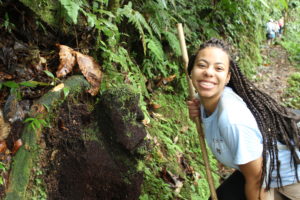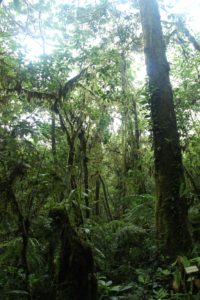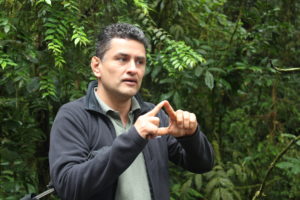Costa Rican rainforests are home to millions of biodiverse organisms. This natural blessing currently attracts more than two million visitors annually to stimulate local economies through ecotourism, and to provide excellent year-round environment for the country. Residents prosper because of spring-fed water sources and pristine air supply aided by the abundance of trees. Both natural resources aid in hydroelectric production and provide employment for many.
Unfortunately, deforestation stands as the biggest threat to the ecosystems in Costa Rica. The Nectandra Cloud Forest Garden promotes the conservation of cloud forests and stewardship of watershed ecosystems in northern Costa Rica. The original owner of Nectandra Garden failed in coffee and banana production but quickly turned to deforestation to try profiting off the land. While deforestation might be attractive to landowners because it can be monetarily rewarding, the cost-benefit analysis does not equal sustainability.

Felice Yarbough smiles alongside a friendly face shaped rock on the Soltis Center hiking pathway in the mountain.
The future of the rainforest is dependent on a collaboration of ethics, environmentalism and effective policymaking. The most important factor in balancing the equation of sustainability is having a common ethical goal for the future of these luscious green spaces. Social Contract Theory plays a huge role in this mountainous environment. Ideally, all residents and tourists need to agree on preservation tactics to allow this area to survive and prosper. It is important to educate the public on the importance of rainforests and their direct impacts. When the majority of people make a promise to preserve these lands, the desire to protect this natural resource will conquer many challenges.
Many hydroelectric dams have been built to convert the natural springs into power needed for homes and factories throughout the country. Several hydroelectric plants hold workshops in “asadas,” which are environmental community committees, to educate individuals about the importance of watersheds. Roberto Alfaro Rojas, a local asada president, explained that he does not lead his group because of money, but to help and educate his community.
As one of the founders of the Nectandra Garden, Luis Billa stated that to have harmony and success in the environment, communities need to find a balance between political systems to prosper indefinitely. The government has taken a hand in this preservation process by creating laws and categories to enact healthy practices and promoting a promising future for our world. The current policies have six categories ranging from protection of resources to availability to do management work. Rules and regulations have been put in place, not necessarily for the sole purpose of saving wildlife, but additionally to save anthropic species.
According to United Nations University, perhaps one of Costa Rica’s greatest contributions to the world can be its successful demonstration of environmental ethics shared by public and private sectors that benefit all. Humans depend on clean air and water to survive and by strengthening the knowledge, skills, and abilities of people in this community it will ensure a bright and near perfect living experience for the generations to come.

